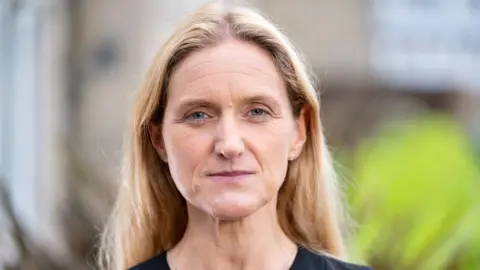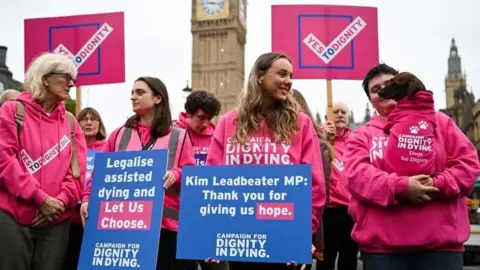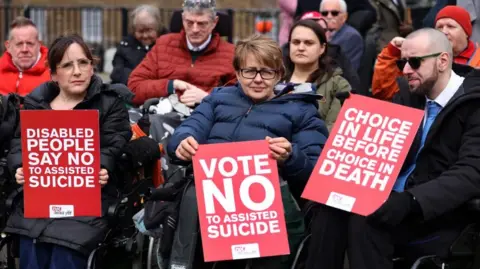
 PA Media
PA Media
MSPs in Scotland will debate and vote on plans to legalise assisted dying later on Tuesday.
It comes days before MPs in Westminster have another chance to consider a separate bill which would legalise assisted dying in England and Wales.
A majority of MPs backed the bill in November 2024, after which a cross-party committee considered the legislation in detail.
How might the law change in Scotland?
The assisted dying bill being considered in the Scottish Parliament says that eligible applicants would have to:
- be resident in Scotland for at least 12 months
- be registered with a GP in Scotland
- be terminally ill
- have the mental capacity to make the request
Earlier in May Liberal Democrat MSP Liam McArthur, who drafted the Assisted Dying for Terminally Ill Adults (Scotland) Bill, said he will raise the minimum age in the proposed legislation from 16 to 18.
The “stage one vote” on Tuesday is on the general principles of the bill. It is a free vote which means MSPs will not be told how to vote by their parties or the government.
If there are more “yes” votes than “noes”, the bill will progress to stage two, where MSPs can propose changes.
Another vote on the final draft of the bill would be held before it could become law.
If MSPs do not back the bill at stage one, it will fall.
First Minister John Swinney and Deputy First Minister Kate Forbes have said they will not support the bill, as have former first ministers Nicola Sturgeon and Humza Yousaf and current Scottish Labour leader Anas Sarwar.
Labour MSP Pam Duncan-Glancy – the first permanent wheelchair user to be elected to Holyrood – is also opposed.
Supporters include Scottish Lib Dem leader Alex Cole-Hamilton, ex-Conservative leader Jackson Carlaw and Scottish Greens co-leaders Lorna Slater and Patrick Harvie.
Scottish Health Secretary Neil Gray, who will speak for the government during the debate, said he would abstain from the vote.
What is the proposed law on assisted dying in England and Wales?
The Terminally Ill Adults (End of Life) Bill was introduced by backbench Labour MP Kim Leadbeater.
It proposes giving terminally ill people the right to choose to end their life if they:
- are over 18 and live in England and Wales, and have been registered with a GP for at least 12 months
- have the mental capacity to make the choice and be deemed to have expressed a clear, settled and informed wish, free from coercion or pressure
- be expected to die within six months
- make two separate declarations, witnessed and signed, about their wish to die
- satisfy two independent doctors that they are eligible – with at least seven days between each assessment
Once a patient’s application has been approved, they would have to wait 14 days before proceeding.
A doctor would prepare the substance being used to end the patient’s life, but the person would take it themselves.
The bill defines the co-ordinating doctor as a registered medical practitioner with “training, qualifications and experience” at a level to be specified by the health secretary. It does not say which drug would be used.
It would be illegal to use dishonesty, pressure, or to coerce someone into declaring they want to end their life, with a possible 14-year prison sentence.
How has the Leadbeater bill changed?
When could assisted dying become law in England and Wales?
Months of activity still lie ahead in the Commons and the Lords.
It is still possible that the bill could fall and not become law at all.
The bill returns to the House of Commons on Friday 16 May, when all MPs will have the chance to propose and vote on further changes.
If MPs back the bill on Friday, it will be subject to further scrutiny in the Commons and the Lords, and more voting.
If the bill is eventually approved, the law would be expected to take effect within two to four years.
How did MPs vote on assisted dying?
The historic vote saw 330 MPs support the assisted dying bill, and 275 reject it.
MPs were given a free vote, meaning they could make their own decision rather than follow party instructions.
The government did not support or oppose the bill.

 Getty Images
Getty Images
Who opposes assisted dying?
Opponents warn that people could be put under pressure to end their lives and want improvements to palliative care instead.
Paralympian and House of Lords crossbencher Baroness Grey-Thompson is a vocal critic.
She told the BBC she is worried about “the impact on vulnerable people, on disabled people, [the risk of] coercive control, and the ability of doctors to make a six-month diagnosis”.

 EPA
EPA
Why do supporters want the law on assisted dying to change?
Leadbeater argues the law needs changing because some people “have a horrible, harrowing death”, however good their end-of-life or palliative care is.
Cancer patient Nathaniel Dye worked on the bill with Leadbeater. He said it would allow people a death which was “as kind and compassionate as possible”.
The Dignity in Dying campaign group said the bill provides the “most detailed, robust proposals” on the issue that “Westminster has ever considered”.
According to chief executive Sarah Wootton, the fact that every year “up to 650 terminally ill people end their own lives, often in lonely and traumatic ways,” shows that the status quo is not working.

 PA Media
PA Media
How might the law change in the Isle of Man and Jersey?
What are assisted dying, assisted suicide and euthanasia?
There is some debate over exactly what the terms mean.
However, assisted dying generally refers to a person who is terminally ill receiving lethal drugs from a medical practitioner, which they administer themselves.
Assisted suicide is intentionally helping another person to end their life, including someone who is not terminally ill. That could involve providing lethal medication or helping them travel to another jurisdiction to die.
Euthanasia is the act of deliberately ending a person’s life to relieve suffering in which a lethal drug is administered by a physician. Patients may not be terminally ill.
There are two types: voluntary euthanasia, where a patient consents; and non-voluntary, where they cannot because, for example, they are in a coma.
Where is euthanasia or assisted dying legal around the world?
The Dignity in Dying campaign group says more than 200 million people around the world have legal access to assisted dying.
Switzerland has allowed assisted suicide since 1942. Its Dignitas facility accepts foreign patients as well as Swiss nationals, and between 1998 and 2023 it helped 571 Britons to die.
Assisted suicide is also legal in Austria.
In the US, 10 states – Oregon, California, New Mexico, Colorado, Washington, Hawaii, New Jersey, Vermont, Maine and Washington DC – allow “physician-assisted dying”. It permits doctors to prescribe lethal drugs for self-administration.
Voluntary euthanasia is legal in Canada, where it is called medical assistance in dying. It can be provided by a doctor or nurse practitioner, either in person or through the prescription of drugs for self-administration. Medically assisted dying accounted for 4.7% of deaths in Canada in 2023.
It is also legal in Spain and Colombia, both of which also permit assisted suicide.
Assisted dying is legal in some parts of Australia, but the law differs across states.
New Zealand‘s End of Life Choice Act legalises assisted dying and allows adults in their final months of life to request assistance from a medical professional.
Three countries have laws that allow people who are not terminally ill to receive assistance to die: The Netherlands, Belgium and Luxembourg.
Update 3 January 2025: This piece has been updated to give further detail on the definition of a co-ordinating doctor.







